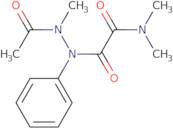Dioxoaminopyrine
CAS: 519-65-3
Ref. 3D-FD22478
| 5mg | Discontinued | ||
| 10mg | Discontinued | ||
| 25mg | Discontinued | ||
| 50mg | Discontinued | ||
| 100mg | Discontinued |
Product Information
- 2-(Dimethylamino)-2-oxo-acetic acid 2-acetyl-2-methyl-1-phenylhydrazide1-Acetyl-1,5,5-trimethyl-2-phenylsemioxamazide
- 1-Acetyl-1,5,5-trimethyl-2-phenylsemioxamazide
- 2-(2-acetyl-2-methyl-1-phenylhydrazinyl)-N,N-dimethyl-2-oxoacetamide
- Acetic acid, (dimethylamino)oxo-, 2-acetyl-2-methyl-1-phenylhydrazide
- Acetic acid, (dimethylamino)oxo-, 2-acetyl-2-methyl-1-phenylhydrazide (9CI)
- Acetic acid, 2-(dimethylamino)-2-oxo-, 2-acetyl-2-methyl-1-phenylhydrazide
- Brn 1822610
- Dioxyaminopyrine
- Dioxypyramidon
- Semioxamazide, 1-acetyl-1,5,5-trimethyl-2-phenyl-
- See more synonyms
- Semioxamazide, 1-acetyl-2-phenyl-1,5,5-trimethyl-
- α-(Dimethylamidooxalyl)-β,β-methylacetylphenylhydrazine
Dioxoaminopyrine is a monocarboxylic acid that is used in pharmaceuticals. It can be synthesized from two amides and a monocarboxylic acid, but the synthesis of an amide requires a chemical reaction that takes place at high temperatures. The synthesis of the other amide can take place at room temperature, which makes it more suitable for industrial production. Dioxoaminopyrine can also be produced by microbial fermentation. Dioxoaminopyrine has been found to have antimicrobial effects on some microorganisms and a cytotoxic effect on some cancer cells. This drug activates pro-caspase-3 and cleaves Bid to truncated Bid (tBid), leading to apoptosis in cancer cells. In addition, dioxoaminopyrine inhibits DNA synthesis in bacteria.





